In today’s fast-paced business environment, organizations in Bangladesh require Enterprise Resource Planning (ERP) software to streamline operations, enhance efficiency, and stay ahead of the competition. The best ERP software centralizes data automates processes, and improves decision-making to drive business growth.
Whether you’re a small business, a growing enterprise, or a multinational corporation, choosing the right ERP software is crucial. Below, we explore the top 6 best ERP software in Bangladesh for 2025 and how they can benefit your business.
Top 6 Best ERP Software in Bangladesh for 2025
1. Odoo ERP – The Most Flexible & Cost-Effective ERP Solution
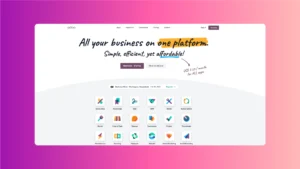
Odoo ERP is a leading open-source ERP software that is highly customizable, allowing businesses to select only the modules they need. It is one of the most widely used ERP systems in Bangladesh due to its flexibility and affordability.
Key Features:
- Open-source and modular – choose the apps your business needs
- Integrated solutions for finance, sales, inventory, HR, and CRM
- User-friendly interface with a minimal learning curve
- Cost-effective and scalable for small to large enterprises
- Available as cloud-based or on-premise deployment
Best for: Startups, SMEs, enterprises, manufacturers, service-based businesses
Looking for expert Odoo implementation? Contact Beyond Bracket today!
2. PrismERP – A Homegrown ERP for Bangladeshi Businesses
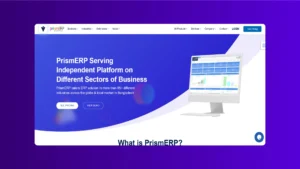
PrismERP, developed by Divine IT Limited, is a Bangladesh-based ERP system tailored to local business needs. It provides VAT compliance and industry-specific solutions, making it a strong choice for Bangladeshi enterprises.
Key Features:
- Designed for Bangladeshi regulations and business models
- Built-in VAT & tax compliance features
- Scalable solutions for finance, HR, and supply chain management
- Cloud-based and on-premise deployment options
- Strong customer support and local implementation teams
Best for: Local businesses, retail enterprises, manufacturers
3. SAP Business One – A Scalable ERP for Large Enterprises
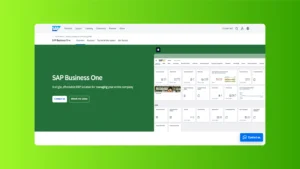
SAP Business One is a leading global ERP system trusted by large corporations and multinational businesses operating in Bangladesh. It streamlines operations enhances financial management, and integrates business processes into a single platform.
Key Features:
- Real-time data tracking & analytics for informed decision-making
- Advanced inventory, supply chain, and financial management tools
- Highly customizable with third-party integrations
- Strong compliance and security features
Best for: Large enterprises, multinational companies, finance & supply chain businesses
4. Microsoft Dynamics 365 – A Cloud-Based ERP with AI Integration
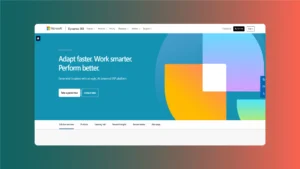
Microsoft Dynamics 365 is a cloud-powered ERP and CRM solution that integrates with Microsoft’s ecosystem for better business intelligence and automation.
Key Features:
- AI-driven automation & business analytics
- Seamless integration with Microsoft 365 (Excel, Outlook, Teams)
- Customizable modules for finance, operations, and customer service
- Cloud-first approach with enhanced scalability
Best for: Tech-driven enterprises, large corporations, service-based industries
5. Tally.ERP 9 – The Best ERP for Accounting & Finance Management

Tally.ERP 9 is widely used in Bangladesh due to its strong finance and accounting capabilities. It is a cost-effective solution for businesses looking to streamline bookkeeping and tax compliance.
Key Features:
- Comprehensive accounting & bookkeeping tools
- VAT & GST compliance for Bangladeshi businesses
- Simplified inventory and payroll management
- Affordable pricing & easy-to-use interface
Best for: Small & medium-sized businesses, finance & accounting firms
6. Oracle ERP Cloud – A Premium Enterprise Solution
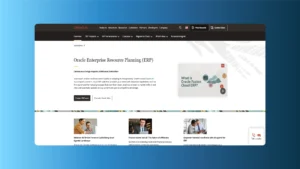
Oracle ERP Cloud is a high-performance enterprise-grade ERP software with AI-driven automation and cloud scalability.
Key Features:
- Cloud-based platform with real-time business insights
- Advanced AI-powered data analytics and automation
- Highly scalable and customizable for enterprise needs
- Industry-specific solutions for finance, manufacturing, and retail
Best for: Large enterprises, government organizations, multinational corporations
ERP Software Comparison: Which One is Right for You?
| ERP Software | Best For | Key Strength |
|---|
| Odoo ERP | SMEs & Enterprises | Customizable, Cost-effective, Modular |
| PrismERP | Local Businesses | Bangladesh-focused, Compliance-ready |
| SAP Business One | Large Enterprises | Scalable, Comprehensive Data Management |
| Microsoft Dynamics 365 | Tech & Service Sectors | AI-Integrated, Cloud-based |
| Tally.ERP 9 | SMEs & Finance | Strong Accounting & VAT Features |
| Oracle ERP Cloud | Large Enterprises | High-End Security & Analytics |
Why Choose Beyond Bracket for Odoo ERP Implementation?
At Beyond Bracket, we specialize in Odoo ERP implementation for businesses in Bangladesh. We help companies customize, deploy, and optimize Odoo ERP to improve workflow and increase efficiency.
Why Work With Us?
- Certified Odoo ERP experts with extensive experience
- Customized solutions tailored to your business needs
- End-to-end implementation, training & support
- Seamless integration with existing systems
- Affordable pricing & ongoing system upgrades
Need a tailored ERP solution? Contact us today! for a free consultation!
Final Thoughts
Choosing the best ERP software in Bangladesh is essential for automating business operations, improving productivity, and driving growth. Whether you choose Odoo, PrismERP, SAP, Microsoft Dynamics, or Oracle, ensure that it aligns with your business goals, industry needs, and budget.
If you’re considering Odoo ERP, Beyond Bracket is here to help. Let’s build an efficient and scalable ERP solution for your business!
Interested in ERP implementation? Schedule a free consultation now!
FAQs
-
What is ERP software, and why is it essential in Bangladesh?
– An ERP system is a comprehensive solution for business. ERP software can add flexibility and adaptability to business growth in Bangladesh.
-
Can Small Businesses benefit from ERP software?
The initial ERP cost is high, though it is worth investing for the long-term growth of a business related to small business.
-
What are the common challenges in implementing ERP software?
High initial cost, customization complexity, proper training, implementation time, and poor project management are some of the potential challenges in the implementation of ERP systems.
-
How to choose the best ERP software for your business?
Choosing the best ERP software for a business depends on the size, budget, and needs of the company.
-
What are the basic requirements for implementing ERP systems?
People, process and priority are the three core requirements for implementing ERP systems. It depends on the needs of organizations related to the prioritized processes involved.
